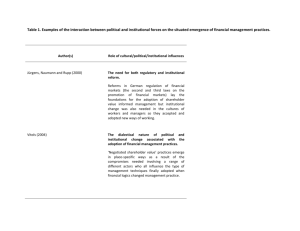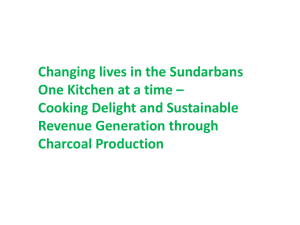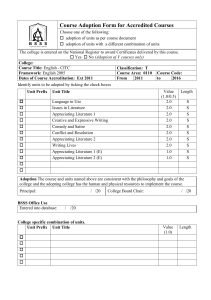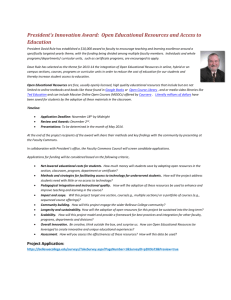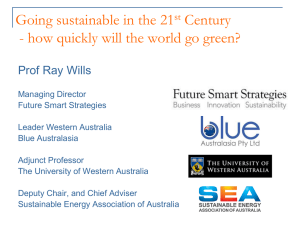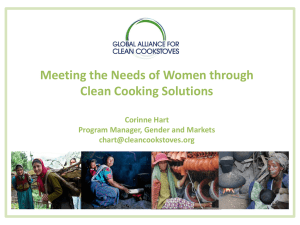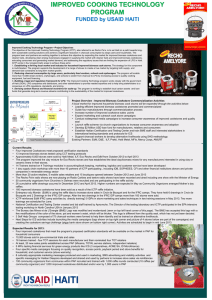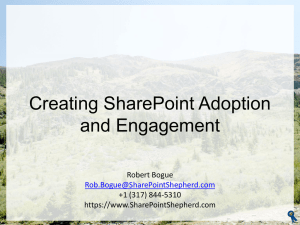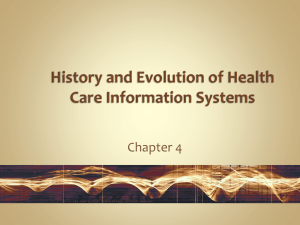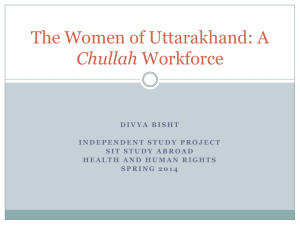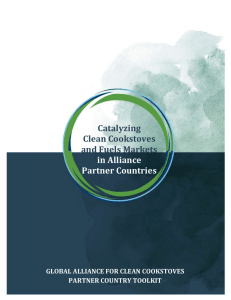wPOWER Hub Research Consultation
advertisement
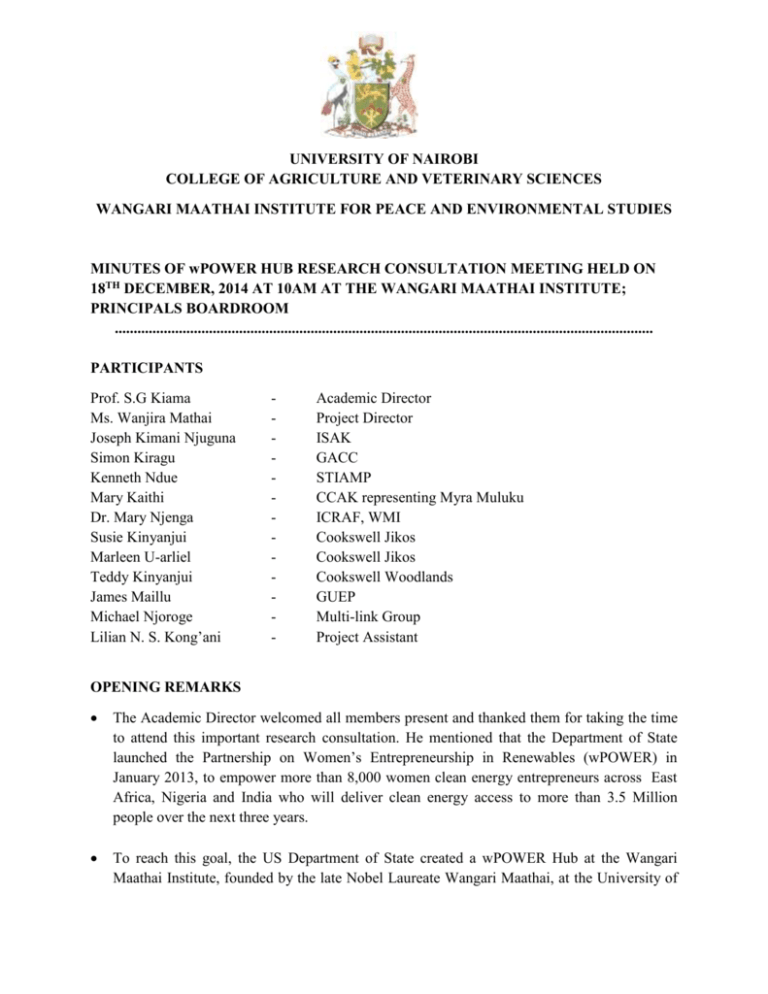
UNIVERSITY OF NAIROBI COLLEGE OF AGRICULTURE AND VETERINARY SCIENCES WANGARI MAATHAI INSTITUTE FOR PEACE AND ENVIRONMENTAL STUDIES MINUTES OF wPOWER HUB RESEARCH CONSULTATION MEETING HELD ON 18TH DECEMBER, 2014 AT 10AM AT THE WANGARI MAATHAI INSTITUTE; PRINCIPALS BOARDROOM ............................................................................................................................................... PARTICIPANTS Prof. S.G Kiama Ms. Wanjira Mathai Joseph Kimani Njuguna Simon Kiragu Kenneth Ndue Mary Kaithi Dr. Mary Njenga Susie Kinyanjui Marleen U-arliel Teddy Kinyanjui James Maillu Michael Njoroge Lilian N. S. Kong’ani - Academic Director Project Director ISAK GACC STIAMP CCAK representing Myra Muluku ICRAF, WMI Cookswell Jikos Cookswell Jikos Cookswell Woodlands GUEP Multi-link Group Project Assistant OPENING REMARKS The Academic Director welcomed all members present and thanked them for taking the time to attend this important research consultation. He mentioned that the Department of State launched the Partnership on Women’s Entrepreneurship in Renewables (wPOWER) in January 2013, to empower more than 8,000 women clean energy entrepreneurs across East Africa, Nigeria and India who will deliver clean energy access to more than 3.5 Million people over the next three years. To reach this goal, the US Department of State created a wPOWER Hub at the Wangari Maathai Institute, founded by the late Nobel Laureate Wangari Maathai, at the University of Nairobi. The Hub is expected to build an evidence-base on women, energy access and climate solutions, hold train the trainer workshops; facilitate African and Indian women entrepreneur and leadership workshops; facilitate African and India women entrepreneur and leadership exchanges to build a network of women climate leaders and build public awareness. This research consultation, therefore, is critical in ensuring that any research the Hub conducts responds to the current needs and gaps in understanding clean energy use, adoption, entrepreneurship and the role of women therein. The Academic Director shared that he is currently the Acting Principal, College of Agriculture and Veterinary Sciences/Director, Wangari Maathai Institute and was scheduled to attend another meeting elsewhere. He therefore requested the Project Director to chair the rest of the meeting. 1. OVER VIEW OF CLEAN ENERGY The Project Director gave a brief overview of what is already known about clean energy, types, uses and effects. The summary is as follows: Types of Energy Biomass Solar Wind Uses Lighting Cooking Warming/heating Farming (pumps, small machine) Effects on: Health Education Women’s empowerment Quality of life/livelihood improvements Hydro Geothermal Brooding Boiling water Cold chain vaccine Information technology among others Food security Environment (emissions, deforestation) Poverty among others Interventions that affect the choice of energy Policy Training R&D Marketing Prevailing community practices Technologies Innovations among others She then indicated that the meeting had been convened to move from the above and discuss the following: a) What are the emerging linkages in the clean energy sector that present opportunities for research? b) Are there gaps in the various areas/types of energy (interventions effects) that still need understanding? 2. POTENTIAL OPPORTUNITIES FOR RESEARCH: The group discussed the various opportunities and noted that: There is need to establish whether people are switching to or from charcoal energy, what is influencing the switching, why and how long it takes for full transition and what transition means for charcoal industry. There is need to establish the role gender plays in the adoption of clean cookstoves or clean technologies It will important to establish the drivers of clean cookstove/technology use: whether this practice of using clean cookstoves is based on gender or otherwise and why some cook stoves are preferred to others. It was noted that in one particular case in Muranga, a majority of the families, acquired clean cookstoves, but many are still using the traditional three stone cook stoves despite the fact that some have more than one type of cookstove. In most cases, the clean energy technologies; for instance, the gasifier (which easily topples over), are being modified by the users seemingly to their convenience. It is therefore necessary to understand some of these modifications and why they are being made. We should also consider establishing whether the brand of the technology is behind its adoption. Biomass energy unlike biogas and others is widely used and therefore it should be the major focus for research. The switching from biomass energy may have a negative effect on charcoal industry, particularly on income for the many middle-men in the charcoal value chain. Understanding this value-chain and the impact of cutting/reducing the use of charcoal could be insightful. Cookswell Jikos, have been considering partnering with producers of clean cookstoves and working with producers to influence their clients to plant trees and make their own charcoal. There is need to establish the manufacturers’ motives for production of clean cookstoves and establish potential collaboration. Investigations indicate that majority of people have not thought of making planting trees to enable production of their own charcoal and therefore there is need educate people on the importance of planting trees and how they can make their own charcoal. Cookswell Jikos have been distributing tree seeds with the sale of each jiko, but the adoption is relatively low. This necessitates the need to establish what happens when the seeds are distributed to the people. Do they plant them?, how best to introduce the idea into business communities to hasten adoption? Mapping of the existing clean energy technologies and cookstove types around the country has not been done. There is need to conduct comprehensive mapping on the available technologies and also establish what else exists in the communities that may need some value addition. Some communities, for instance in Samburu, have stoves that could be considered clean and may only need some little improvements. This may also help us understand the low adoption rates from some of the newer technologies. The mapping of the existing clean energy technologies could benefit from some secondary data that is already in existence. It would also be ideal to map adoption and clean energy technologies independently. There is also need to understand the existing technologies among communities and the linkages with cultural sensitivity through mapping. Some research should also focus on the clean energy technologies and impacts on food and nutrition security. Standardization has facilitated cookstoves tier ratings depending on their efficiency and there is need to understand standardization issues. The tier ratings do not always reflect the reality on the ground. Often these ratings are inaccurate because investigations indicate that there are “better” cookstoves in communities that have not been mapped and hence not rated. There was considerable dicussion about the merit of tiering the stoves. However, the GACC believes strongly that there is need to know whether the existing cookstoves are efficient and contribute to reduced emissions related diseases and deaths in the quest to address clean cooking. There may be some research opportunities in this area. Awareness creation and information sharing on the impacts of clean energy technologies has been inadequate and is a critical research area of concern. This is partially informed by the awareness campaigns conducted by the Clean Cookstoves Association of Kenya (CCAK) which established that families struggle with indoor air pollution health related impacts; and were willing to adopt the new technologies. There is need to consider establishing the linkages between adoption and cultural issues as one of the key thematic areas. Some investigations elsewhere had indicated that women were resistant to adoption because they felt that the time spent fetching wood is an important social exercise where they interact and share with their friends. There is need to interrogate further and critically analyze clean energy technologies communication packaging to enable influence consumers/communities change of attitude and behavior thus encourage easily adoption of the technologies. There is need to consider how to address financial aspect in the production of clean energy technologies through adoption by the users to remove adoption barriers. It was indicated that affordability is a matter of concern as indicated by some users. The Project Director summarized the emerging research areas as follows: 1. Biomass energy and how people are switching, factors that are influencing the switching and linkages to deforestation 2. 3. 4. 5. 6. 7. 8. 9. The potential impacts of clean energy technologies and fuel choices Mapping of clean energy technologies and fuel Mapping of adoption of clean energy technologies. Qualities of tiers including the entire value chain and the charcoal value chain as an independent subject. Attitude and behavioral changes and working with the existing data or professionals Cultural elements surrounding the adoption of clean energy technologies. Energy policy implementation and particularly review of charcoal policy Establish how to address financial aspects as barriers to adoption 3. ANY OTHER BUSINESS a) Research gap identification goal The participants wanted to know what the Institute’s goal is in ascertaining the research gaps. In response, they were informed that, the Hub is keen on conducting research whose findings will benefit all partners by addressing some of their key concerns and shedding light on best practices that would assist them in addressing the challenges they face. b) The Scope of Research fund support The participants also wanted to know if the research fund support could go beyond the University of Nairobi. The Project Director indicated that she would consult further and give the feedback in due course. c) Information sharing The participants indicated that it would be ideal for the Institute to consider sharing of research findings via an online platform. The Project Director responded that it is the responsibility of the Hub to develop and share information both local and globally and this is indeed one of our priorities. The Hub is working with some partners from Rwanda, India, Nigeria, Uganda and even Tanzania and this creates an ideal platform to learn from diverse experiences and share the same widely. d) WMI Seminars The Project Director informed the participants that the Institute conducts frequent seminars through which it invites speakers from diverse fields to share their knowledge and experiences with the students. These seminars are critical in facilitating choices of their topics of research. She welcomed any participant who would wish to give a talk to get in touch with the Institute. The participants could also consider organizing or inviting students for field training. e) PhD Research Opportunities at GUEP Mr. James from GUEP noted that his organization is in search for a PhD student who may be interested in conducting research on biomass and solar energy. He was advised to get in touch with the Director of WMI, Prof. Kiama who is working with Dr. Mary Njenga on this area. Dr. Njenga is currently working with the Institute on clean energy for further deliberation. f) The next meeting It was noted that the Hub will convene at least three more meetings to advance the discussed outcomes. The dates will be communicated to participants in due course. There being no other business, the meeting was adjourned at 12:30pm. Approved for issue: ________________________________ Date_________________ Project/Academic Director
